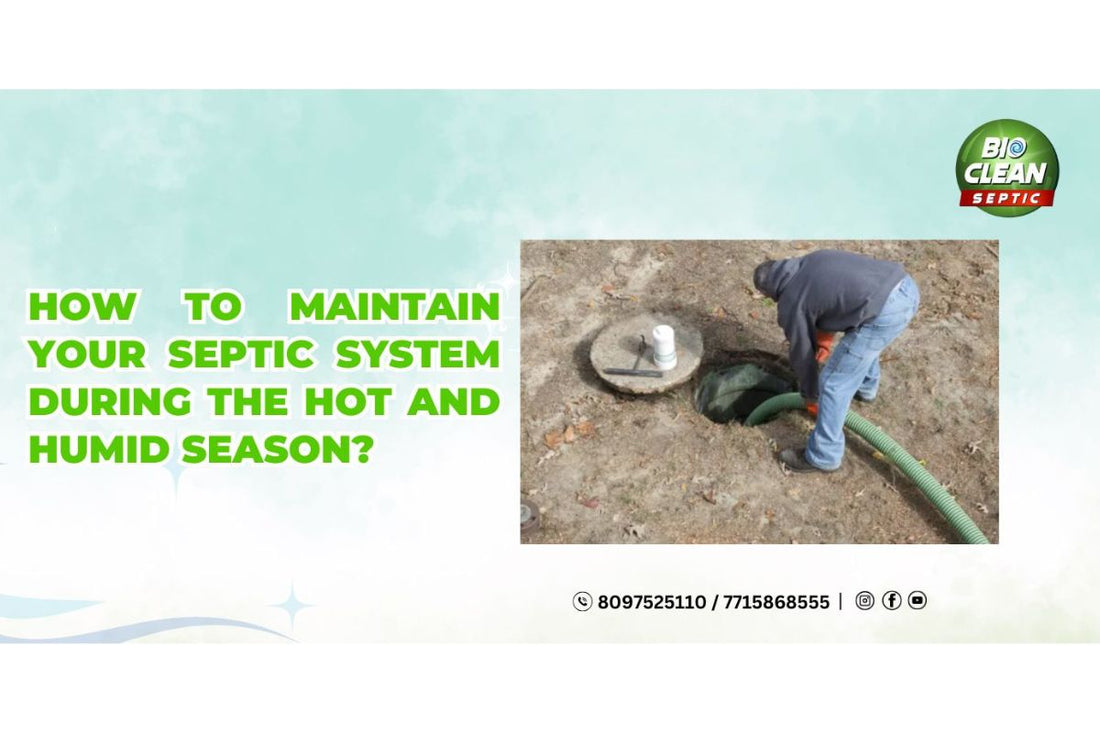
How to Maintain Your Septic System During the Hot and Humid Season?
Share
Do you know there is always a high risk of septic tank damage with the approaching summer and humidity? This increases water usage and leads to excessive bacteria growth. Soil-saturated issues also impact the entire drain system, causing bad smells, slower drainage, and costly septic tank repairs.
If you don’t want such challenging hassles and your septic tank running, it's imperative to keep it maintained. You may need to follow simple precautions, as the combination of heat and moisture can impact the septic system flow.
Therefore, it is important to understand how to maintain a septic tank care routine during the summer and humid season.

Keeping it maintained will make your property healthier, the environment safer, and people risk-free from unpleasant surprises.
Read the ultimate guide to prevent septic tank backups and unexpected issues in the hottest months of the year.
The Major Understanding How Heat & Humidity Affect Septic Systems
By addressing the proactive challenges here, you will get an efficient reach to ensure the septic system works properly. Here are reasons that let you know how humid and hot weather impacts septic systems;
High Bacterial Activity
Increased temperature accelerates bacterial activities and bacteria decomposition. Therefore, it causes excessive gas and a bad smell in the surroundings.
Soil Saturation Issues
Heavy rainfall and high humidity can cause soil to become oversaturated. This eventually impacts the drain field because it reduces the ability to absorb and filter wastewater.
Evaporation and Water Usage
The system can strain if you don’t maintain your septic tank properly and use hot water for daily needs.
Root Growth
Water temperature typically encourages root growth, which can invade septic pipes and cause blockages.
The Must Follow Tips To Maintain Septic Tank In Hot & Humid Weather
Maintaining a septic tank in hot and humid seasons is important for optimal performance and longevity. The high temperatures and increased moisture levels accelerate waste decomposition.
By incorporating the measures described below, you can safeguard your septic tank system from issues in hot and humid climate conditions. Let’s dive into the essential tips you must implement to maintain a septic tank effectively.
Monitor Your Water Usage
The best is to avoid excessive water loading to the septic tank as it can slow down the drainage or cause backups. The best is to avoid taking multiple laundry loads in a single day, but spreading them out won’t strain your drainfield.
You must also install water-efficient fixtures in a home, like low-flow toilets, faucets, etc, to minimise water usage. Apart if there is any water leakage, call the plumber immediately.
Fix the issues as the smallest leakage contributes to high damage to property and excessive septic tank loading unnecessarily.
Keep an Eye on the Drain Field
Inspecting the drainage field is important to maintaining and functioning the septic system. Ensure you are not parking heavy vehicles and equipment on the drain field. This can compact the soil, reducing the ability to filter wastewater.
Don’t plant trees and greenery around the septic system, as roots can infiltrate the pipes, causing clogs and preventing the system from functioning properly.
Pumping Septic Tank Regularly
If you don’t want your septic tank operations to get hampered, regular pumping is necessary. It not only prevents solid waste buildup but is risks-free from clogging and system failure. Septic tanks must be pumped in every 3 to 5 years.
Apart from timely inspection, it can beat the heated season without stress. You must call a professional septic tank pumping service if any warning signs persist, like slow drains, sewage smells, or unnecessary pooling of water around in the drain field.
Use Septic-Safe Products
It's good to buy septic-safe products and avoid harsh chemicals. The best thing is to have biodegradable items like bleach and antibacterial cleaners that kill bacteria and help break down waste.
Shop for biodegradable toilet paper. Use grease and oils to solidify clogged pipes.
Keep Control of Foul Odours
Hot weather can amplify septic odours. To reduce the unpleasant smell, keep vent pipes clean and functioning. You can use biological additives to reduce foul odour and maintain bacterial growth.
Prevent Root Intrusion
Like moisture and nutrients, trees and plants' roots are drawn to septic pipes. Therefore, to prevent damage, keep plants and trees away from the drain field or septic tank. It is also best to use root barriers around the septic tank.
Divert Rainwater Away
Excessive moisture risks damaging the septic tank and drain field. To reduce this risk, use it to ensure proper gutter placement on your property.
Grading the landscape to prevent water accumulation near the drain is also beneficial. It absorbs excessive rainwater and prevents soil saturation.
Mindful With Household Water Use
Follow best practices if you don’t want your drain and septic tank affected. Disposing of grease, like cooking oil, into the drain is risky.
Food scraps can also overload the septic tank, so avoid disposing of them directly. Solvents like chemicals, paint, and pesticides can disrupt the bacterial balance.
Timely Inspection
Routine inspection is worthy of reducing the risk with the septic tank. It helps identify potential issues before major problems.
Hire a licensed septic tank professional for system accessibility and inspection. Self-check warning signs, such as slowed drainage, gurgling sounds, foul odours, etc., are also useful.
The Final Verdict
If you don’t want your property damaged and your surroundings impacted, then maintaining your septic system is important in hot and humid seasons. The above-mentioned tips will definitely help prevent serious septic tank challenges.
From conserving water to managing household waste to maintaining the drain field, everything works in favour of keeping the septic system functional. However, neglecting it with timely care and maintenance is nothing but a risk to people, property and the environment.
Adopting simple maintenance habits like spreading the laundry loads and fixtures to water leakages and diversion of excessive rainwater can make a huge difference. If you suspect any issue, don’t go for DIY; call a septic tank professional immediately to address concerns before things get worse and escalate.
A little care can save you from major headaches and extend your septic tank life. By following these seasonal maintenance tips, you can have summer worry-free. Take the necessary steps today and evaluate your septic system with Bioclean Septic Tank Cleaning Powder to ensure it will continue serving you reliably for years and protection from septic failures.
